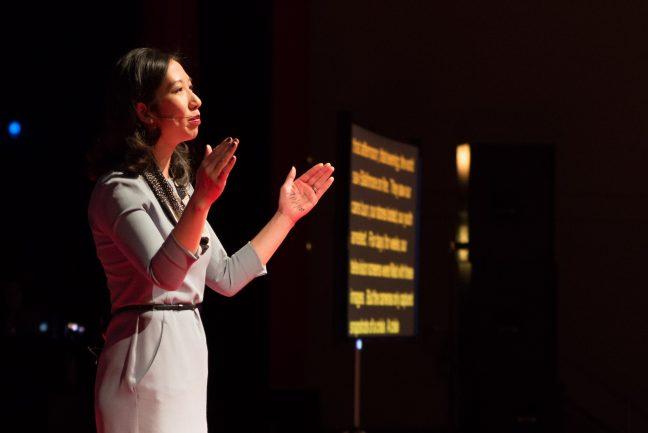In an event hosted by the Wisconsin Union Directorate’s Distinguished Lecture Series Wednesday, speaker Leana Wen advocated for what she believes can be real, tangible solutions to the problems faced in public health.
Wen is the current health commissioner for the City of Baltimore, a position through which she sets and implements public health policy. Wen brought decades of experience as an emergency room medical doctor, public health professor and policymaker to the lecture.
In her lecture, Wen stressed the ideas of taking action to bring about real change in combating public health disparities. She identified three concepts she said could be most effective on this front.
The first concept Wen identified as a possible agent for change in public health was challenging the “pervasive narrative of choice.”
Wen said the idea everyone has equal access and ability to make good choices for their health is false, and understanding this is essential to combating disparities.
“Choice is predicated on privilege, and privilege is not something everyone has,” Wen said.
Wen said wealthier people in the United States have greater access and ability to buy healthy foods and live healthy lifestyles — something which she said is disproportionately concentrated in the hands of white Americans compared to people of color, particularly black Americans.
Wen said unhealthy lifestyles are oftentimes the only option open to families of low socioeconomic status, which makes the “narrative of choice” false. She identified combating this narrative as one mechanism by which action can be taken to reduce racial health disparities.
Wen also stressed the importance of immediate action, rather than “admiring” the problem through inactive academic studies which tell the public information it already knows to be true.
“We have studied these problems to death,” Wen said. “I don’t mean that we shouldn’t do more research, but I don’t need another research study to tell me about the problems and disparities that exist.”
Instead of studying the problem, Wen advocated for active solutions to combat the problem. She said small, seemingly ineffective solutions can sometimes have great effects.
When Wen first came to Baltimore, she said less than 20 percent of students who were screened as needing eyeglasses actually had them, which can have adverse effects on their ability to perform well in class and vision, and even further rippling effects from that.
She said providing eyeglasses to students helped in part to combat the disparity in educational achievement levels, which remain stark in the city and which have rippling effects to many other areas.
Wen believes no matter how small an action may seem, or how ineffective its outcome may appear, it is important to pursue that action.
“If there is one tangible thing we can do that we know can make a difference, let’s not get paralyzed … because there is something that we can do right now,” Wen said.
Calling out problems when we see them was the third concept for taking action identified by Wen. In the public health sector, Wen said one of the most pervasive problems which must be called out is stigma, particularly as it is attached to addiction.
Wen said the way addiction is addressed has changed, as it now seen as more of a disease than a choice. She said the change in how addiction is perceived is due in part to the fact that the opioid epidemic has begun to affect the white community.
“We have incarcerated generations of black and brown people to whom we owe an apology, because if we understand addiction to be a disease now, we sure didn’t treat it like that a couple of years ago,” Wen said.
In her closing remarks, Wen advocated for immediate action on these and other issues on everyone’s behalf, and stressed that those who stand up against injustice are on the “right side of history.”


